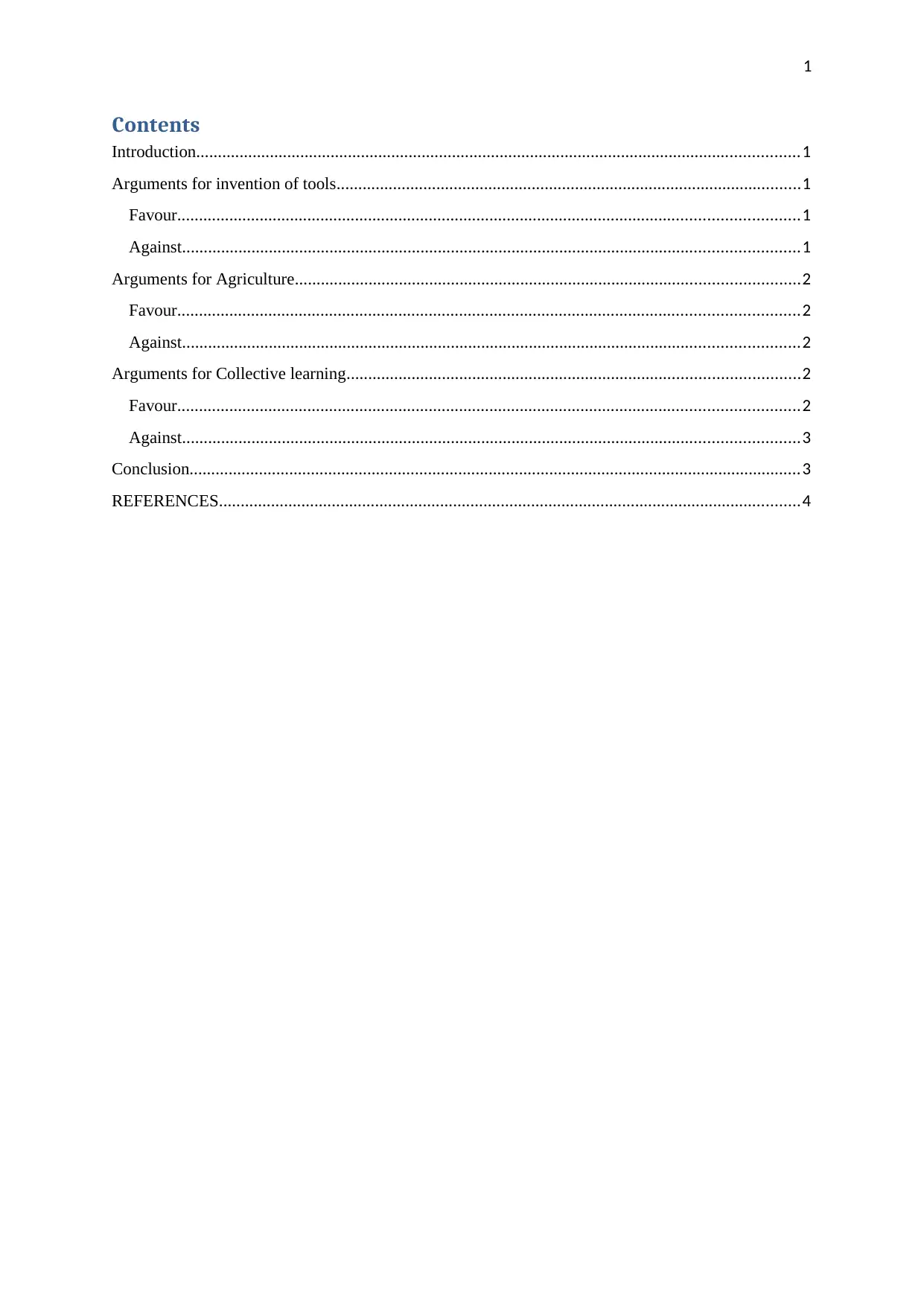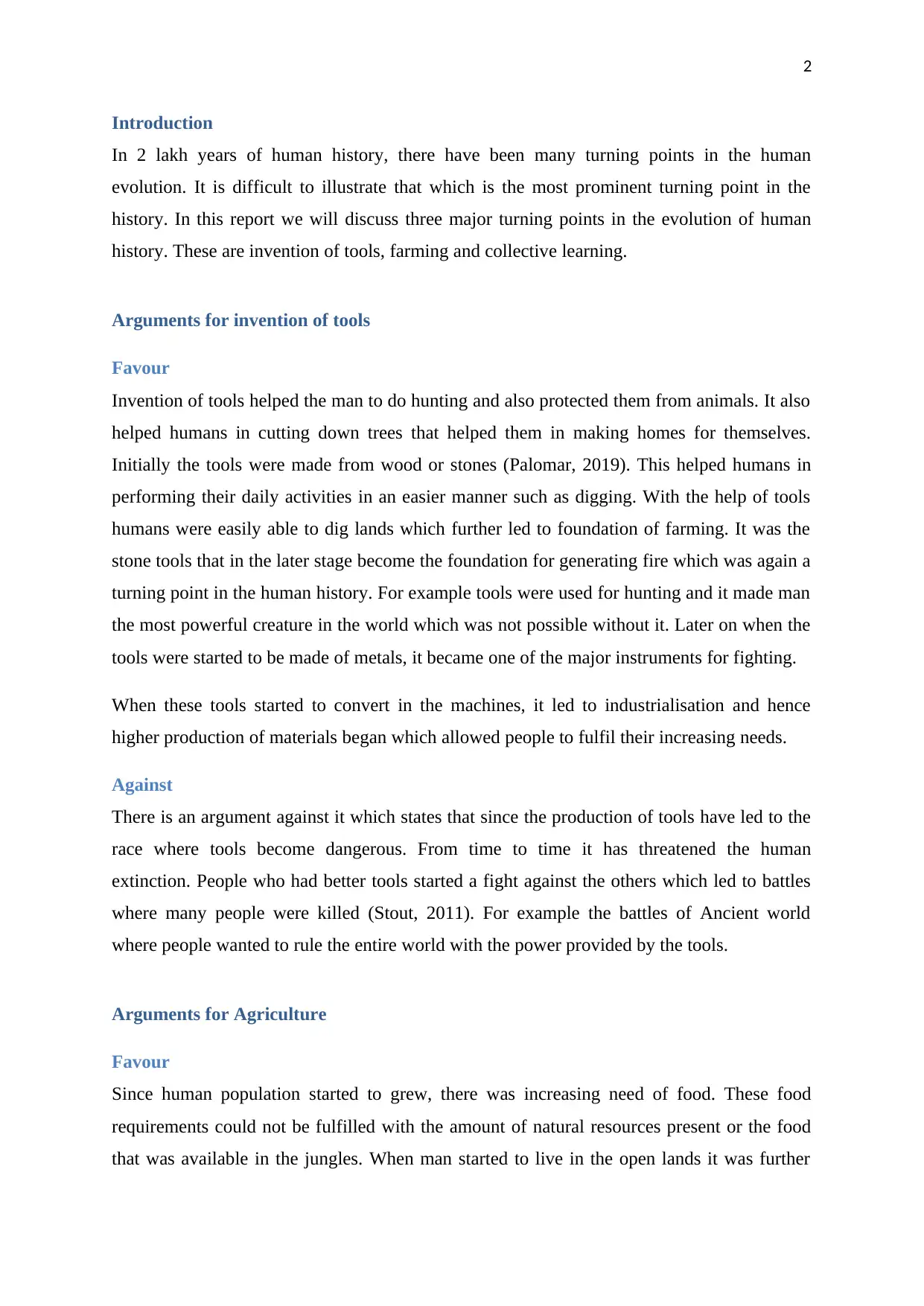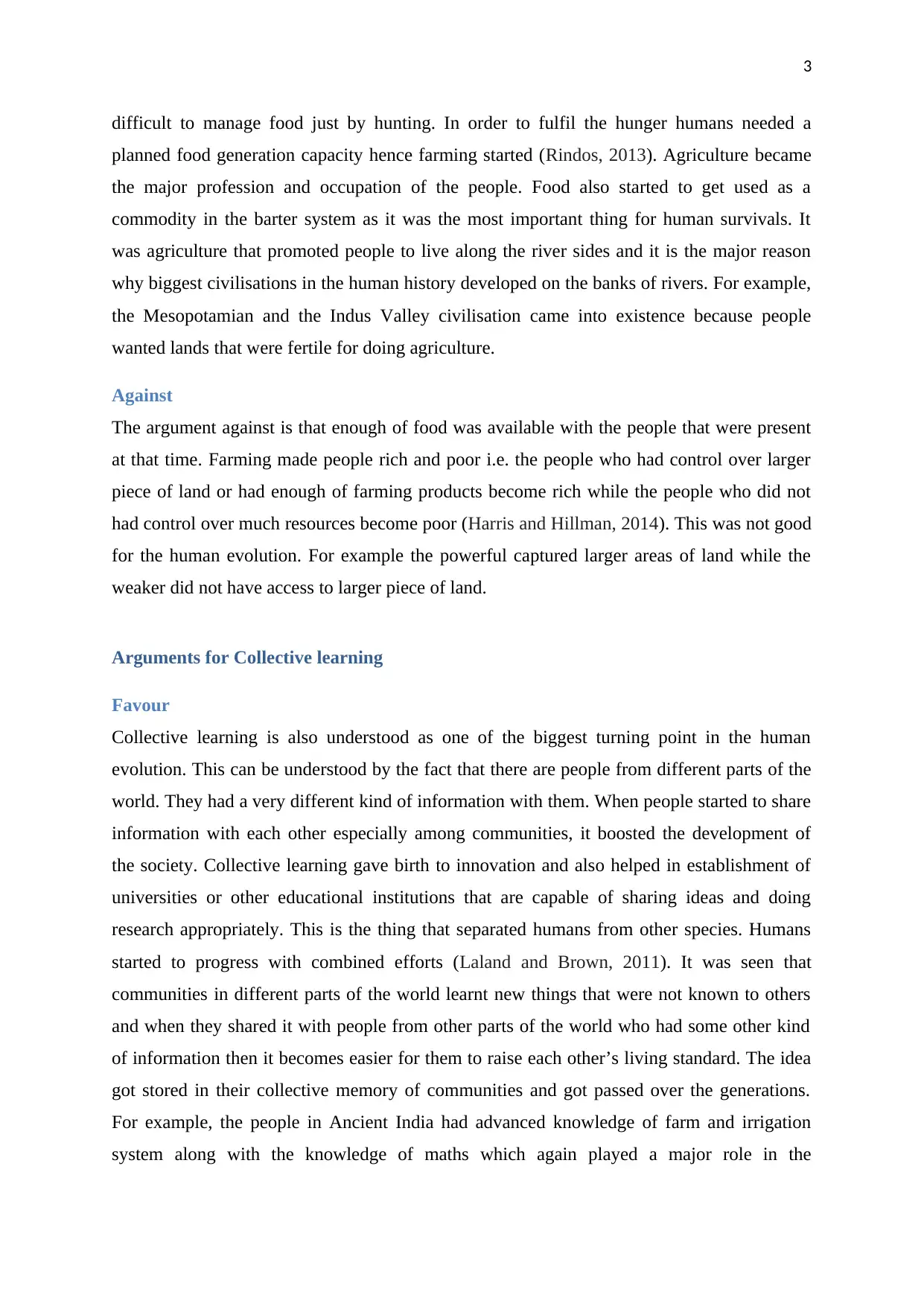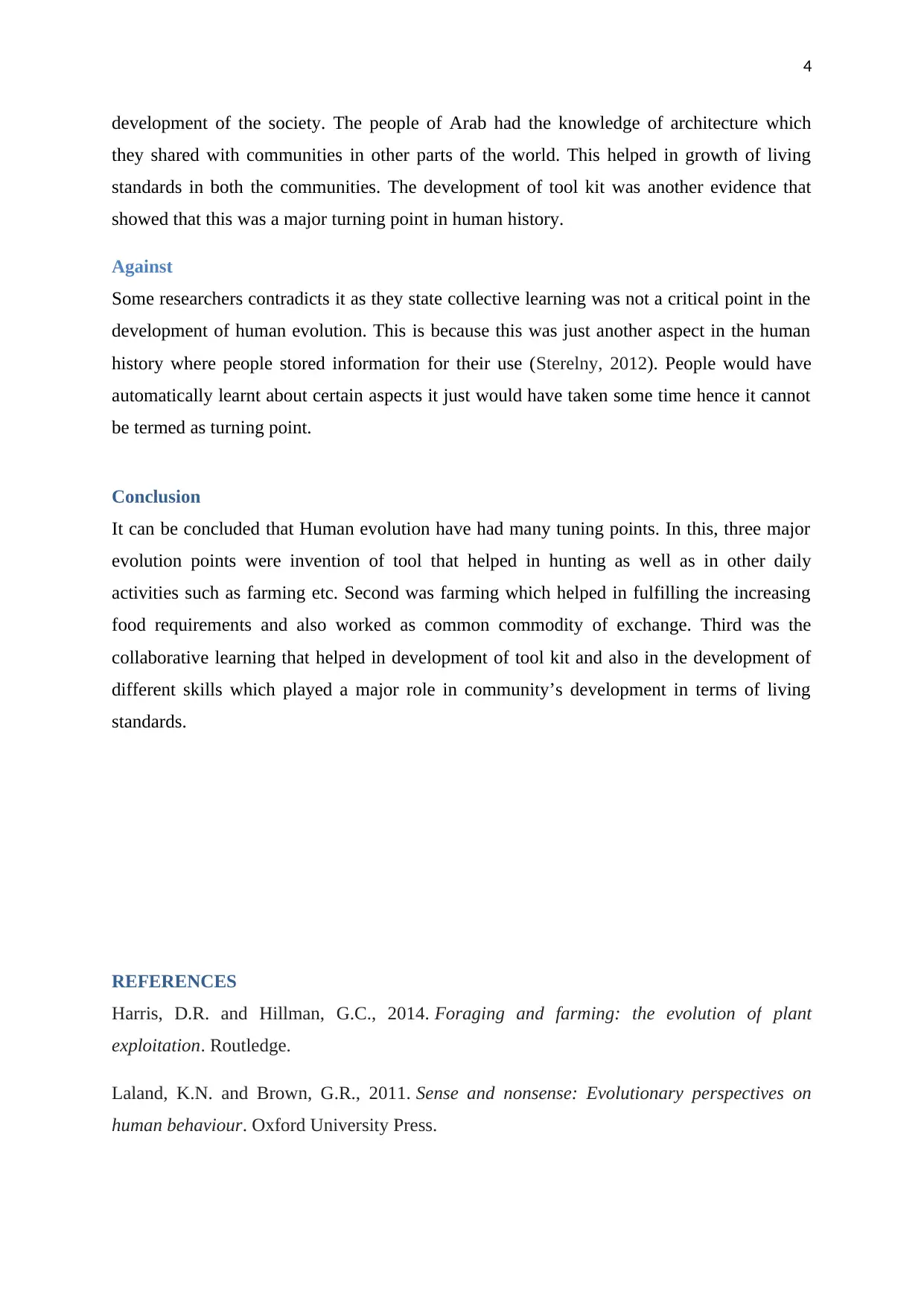Turning Points in Human History: A Big History Perspective Report
VerifiedAdded on 2022/11/26
|6
|1250
|496
Report
AI Summary
This report examines three major turning points in human history: the invention of tools, agriculture, and collective learning. The report explores the arguments for and against each turning point, discussing the advantages and disadvantages of tools for hunting and defense, the role of agriculture in meeting food demands and shaping civilizations, and the impact of collective learning on innovation and societal development. It highlights how tools facilitated daily activities and farming, agriculture addressed food scarcity and established trade, and collective learning fostered advancements and knowledge sharing across communities. The report concludes by emphasizing the significance of these turning points in human evolution, shaping societies and improving living standards, as well as the counter-arguments against each turning point.

BIG HISTORY
Paraphrase This Document
Need a fresh take? Get an instant paraphrase of this document with our AI Paraphraser

1
Contents
Introduction...........................................................................................................................................1
Arguments for invention of tools...........................................................................................................1
Favour...............................................................................................................................................1
Against..............................................................................................................................................1
Arguments for Agriculture....................................................................................................................2
Favour...............................................................................................................................................2
Against..............................................................................................................................................2
Arguments for Collective learning........................................................................................................2
Favour...............................................................................................................................................2
Against..............................................................................................................................................3
Conclusion.............................................................................................................................................3
REFERENCES......................................................................................................................................4
Contents
Introduction...........................................................................................................................................1
Arguments for invention of tools...........................................................................................................1
Favour...............................................................................................................................................1
Against..............................................................................................................................................1
Arguments for Agriculture....................................................................................................................2
Favour...............................................................................................................................................2
Against..............................................................................................................................................2
Arguments for Collective learning........................................................................................................2
Favour...............................................................................................................................................2
Against..............................................................................................................................................3
Conclusion.............................................................................................................................................3
REFERENCES......................................................................................................................................4

2
Introduction
In 2 lakh years of human history, there have been many turning points in the human
evolution. It is difficult to illustrate that which is the most prominent turning point in the
history. In this report we will discuss three major turning points in the evolution of human
history. These are invention of tools, farming and collective learning.
Arguments for invention of tools
Favour
Invention of tools helped the man to do hunting and also protected them from animals. It also
helped humans in cutting down trees that helped them in making homes for themselves.
Initially the tools were made from wood or stones (Palomar, 2019). This helped humans in
performing their daily activities in an easier manner such as digging. With the help of tools
humans were easily able to dig lands which further led to foundation of farming. It was the
stone tools that in the later stage become the foundation for generating fire which was again a
turning point in the human history. For example tools were used for hunting and it made man
the most powerful creature in the world which was not possible without it. Later on when the
tools were started to be made of metals, it became one of the major instruments for fighting.
When these tools started to convert in the machines, it led to industrialisation and hence
higher production of materials began which allowed people to fulfil their increasing needs.
Against
There is an argument against it which states that since the production of tools have led to the
race where tools become dangerous. From time to time it has threatened the human
extinction. People who had better tools started a fight against the others which led to battles
where many people were killed (Stout, 2011). For example the battles of Ancient world
where people wanted to rule the entire world with the power provided by the tools.
Arguments for Agriculture
Favour
Since human population started to grew, there was increasing need of food. These food
requirements could not be fulfilled with the amount of natural resources present or the food
that was available in the jungles. When man started to live in the open lands it was further
Introduction
In 2 lakh years of human history, there have been many turning points in the human
evolution. It is difficult to illustrate that which is the most prominent turning point in the
history. In this report we will discuss three major turning points in the evolution of human
history. These are invention of tools, farming and collective learning.
Arguments for invention of tools
Favour
Invention of tools helped the man to do hunting and also protected them from animals. It also
helped humans in cutting down trees that helped them in making homes for themselves.
Initially the tools were made from wood or stones (Palomar, 2019). This helped humans in
performing their daily activities in an easier manner such as digging. With the help of tools
humans were easily able to dig lands which further led to foundation of farming. It was the
stone tools that in the later stage become the foundation for generating fire which was again a
turning point in the human history. For example tools were used for hunting and it made man
the most powerful creature in the world which was not possible without it. Later on when the
tools were started to be made of metals, it became one of the major instruments for fighting.
When these tools started to convert in the machines, it led to industrialisation and hence
higher production of materials began which allowed people to fulfil their increasing needs.
Against
There is an argument against it which states that since the production of tools have led to the
race where tools become dangerous. From time to time it has threatened the human
extinction. People who had better tools started a fight against the others which led to battles
where many people were killed (Stout, 2011). For example the battles of Ancient world
where people wanted to rule the entire world with the power provided by the tools.
Arguments for Agriculture
Favour
Since human population started to grew, there was increasing need of food. These food
requirements could not be fulfilled with the amount of natural resources present or the food
that was available in the jungles. When man started to live in the open lands it was further
⊘ This is a preview!⊘
Do you want full access?
Subscribe today to unlock all pages.

Trusted by 1+ million students worldwide

3
difficult to manage food just by hunting. In order to fulfil the hunger humans needed a
planned food generation capacity hence farming started (Rindos, 2013). Agriculture became
the major profession and occupation of the people. Food also started to get used as a
commodity in the barter system as it was the most important thing for human survivals. It
was agriculture that promoted people to live along the river sides and it is the major reason
why biggest civilisations in the human history developed on the banks of rivers. For example,
the Mesopotamian and the Indus Valley civilisation came into existence because people
wanted lands that were fertile for doing agriculture.
Against
The argument against is that enough of food was available with the people that were present
at that time. Farming made people rich and poor i.e. the people who had control over larger
piece of land or had enough of farming products become rich while the people who did not
had control over much resources become poor (Harris and Hillman, 2014). This was not good
for the human evolution. For example the powerful captured larger areas of land while the
weaker did not have access to larger piece of land.
Arguments for Collective learning
Favour
Collective learning is also understood as one of the biggest turning point in the human
evolution. This can be understood by the fact that there are people from different parts of the
world. They had a very different kind of information with them. When people started to share
information with each other especially among communities, it boosted the development of
the society. Collective learning gave birth to innovation and also helped in establishment of
universities or other educational institutions that are capable of sharing ideas and doing
research appropriately. This is the thing that separated humans from other species. Humans
started to progress with combined efforts (Laland and Brown, 2011). It was seen that
communities in different parts of the world learnt new things that were not known to others
and when they shared it with people from other parts of the world who had some other kind
of information then it becomes easier for them to raise each other’s living standard. The idea
got stored in their collective memory of communities and got passed over the generations.
For example, the people in Ancient India had advanced knowledge of farm and irrigation
system along with the knowledge of maths which again played a major role in the
difficult to manage food just by hunting. In order to fulfil the hunger humans needed a
planned food generation capacity hence farming started (Rindos, 2013). Agriculture became
the major profession and occupation of the people. Food also started to get used as a
commodity in the barter system as it was the most important thing for human survivals. It
was agriculture that promoted people to live along the river sides and it is the major reason
why biggest civilisations in the human history developed on the banks of rivers. For example,
the Mesopotamian and the Indus Valley civilisation came into existence because people
wanted lands that were fertile for doing agriculture.
Against
The argument against is that enough of food was available with the people that were present
at that time. Farming made people rich and poor i.e. the people who had control over larger
piece of land or had enough of farming products become rich while the people who did not
had control over much resources become poor (Harris and Hillman, 2014). This was not good
for the human evolution. For example the powerful captured larger areas of land while the
weaker did not have access to larger piece of land.
Arguments for Collective learning
Favour
Collective learning is also understood as one of the biggest turning point in the human
evolution. This can be understood by the fact that there are people from different parts of the
world. They had a very different kind of information with them. When people started to share
information with each other especially among communities, it boosted the development of
the society. Collective learning gave birth to innovation and also helped in establishment of
universities or other educational institutions that are capable of sharing ideas and doing
research appropriately. This is the thing that separated humans from other species. Humans
started to progress with combined efforts (Laland and Brown, 2011). It was seen that
communities in different parts of the world learnt new things that were not known to others
and when they shared it with people from other parts of the world who had some other kind
of information then it becomes easier for them to raise each other’s living standard. The idea
got stored in their collective memory of communities and got passed over the generations.
For example, the people in Ancient India had advanced knowledge of farm and irrigation
system along with the knowledge of maths which again played a major role in the
Paraphrase This Document
Need a fresh take? Get an instant paraphrase of this document with our AI Paraphraser

4
development of the society. The people of Arab had the knowledge of architecture which
they shared with communities in other parts of the world. This helped in growth of living
standards in both the communities. The development of tool kit was another evidence that
showed that this was a major turning point in human history.
Against
Some researchers contradicts it as they state collective learning was not a critical point in the
development of human evolution. This is because this was just another aspect in the human
history where people stored information for their use (Sterelny, 2012). People would have
automatically learnt about certain aspects it just would have taken some time hence it cannot
be termed as turning point.
Conclusion
It can be concluded that Human evolution have had many tuning points. In this, three major
evolution points were invention of tool that helped in hunting as well as in other daily
activities such as farming etc. Second was farming which helped in fulfilling the increasing
food requirements and also worked as common commodity of exchange. Third was the
collaborative learning that helped in development of tool kit and also in the development of
different skills which played a major role in community’s development in terms of living
standards.
REFERENCES
Harris, D.R. and Hillman, G.C., 2014. Foraging and farming: the evolution of plant
exploitation. Routledge.
Laland, K.N. and Brown, G.R., 2011. Sense and nonsense: Evolutionary perspectives on
human behaviour. Oxford University Press.
development of the society. The people of Arab had the knowledge of architecture which
they shared with communities in other parts of the world. This helped in growth of living
standards in both the communities. The development of tool kit was another evidence that
showed that this was a major turning point in human history.
Against
Some researchers contradicts it as they state collective learning was not a critical point in the
development of human evolution. This is because this was just another aspect in the human
history where people stored information for their use (Sterelny, 2012). People would have
automatically learnt about certain aspects it just would have taken some time hence it cannot
be termed as turning point.
Conclusion
It can be concluded that Human evolution have had many tuning points. In this, three major
evolution points were invention of tool that helped in hunting as well as in other daily
activities such as farming etc. Second was farming which helped in fulfilling the increasing
food requirements and also worked as common commodity of exchange. Third was the
collaborative learning that helped in development of tool kit and also in the development of
different skills which played a major role in community’s development in terms of living
standards.
REFERENCES
Harris, D.R. and Hillman, G.C., 2014. Foraging and farming: the evolution of plant
exploitation. Routledge.
Laland, K.N. and Brown, G.R., 2011. Sense and nonsense: Evolutionary perspectives on
human behaviour. Oxford University Press.

5
Palomar, 2019. Early Human Culture. [Online] Available at:
https://www2.palomar.edu/anthro/homo/homo_4.htm. [Accessed on 17th May 2019]
Rindos, D., 2013. The origins of agriculture: an evolutionary perspective. Academic Press.
Sterelny, K., 2012. The evolved apprentice. MIT press.
Stout, D. 2011. Stone toolmaking and the evolution of human culture and cognition. [Online]
Available at: https://www.ncbi.nlm.nih.gov/pmc/articles/PMC3049103/. [Accessed on 17th
May 2019]
Palomar, 2019. Early Human Culture. [Online] Available at:
https://www2.palomar.edu/anthro/homo/homo_4.htm. [Accessed on 17th May 2019]
Rindos, D., 2013. The origins of agriculture: an evolutionary perspective. Academic Press.
Sterelny, K., 2012. The evolved apprentice. MIT press.
Stout, D. 2011. Stone toolmaking and the evolution of human culture and cognition. [Online]
Available at: https://www.ncbi.nlm.nih.gov/pmc/articles/PMC3049103/. [Accessed on 17th
May 2019]
⊘ This is a preview!⊘
Do you want full access?
Subscribe today to unlock all pages.

Trusted by 1+ million students worldwide
1 out of 6
Your All-in-One AI-Powered Toolkit for Academic Success.
+13062052269
info@desklib.com
Available 24*7 on WhatsApp / Email
![[object Object]](/_next/static/media/star-bottom.7253800d.svg)
Unlock your academic potential
Copyright © 2020–2025 A2Z Services. All Rights Reserved. Developed and managed by ZUCOL.